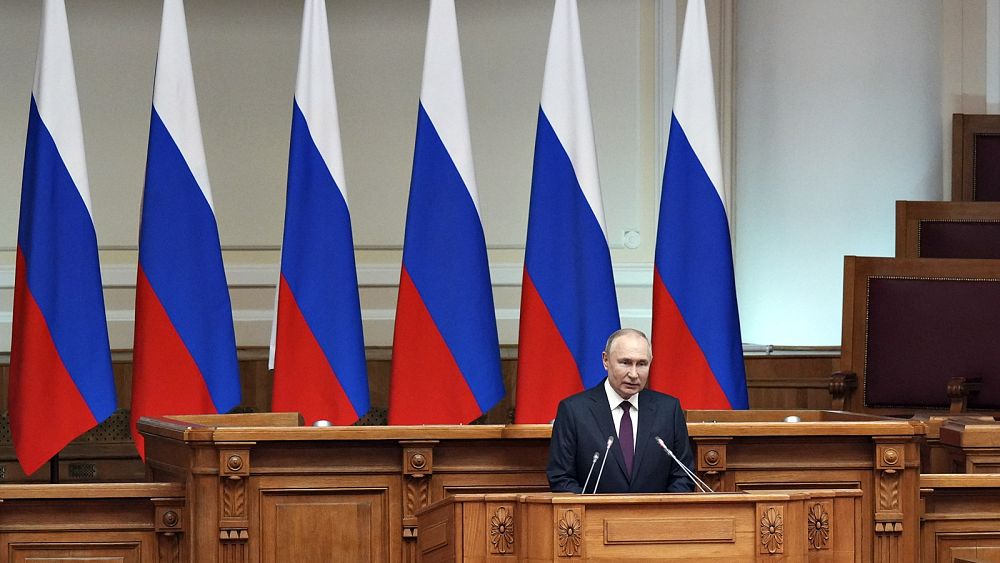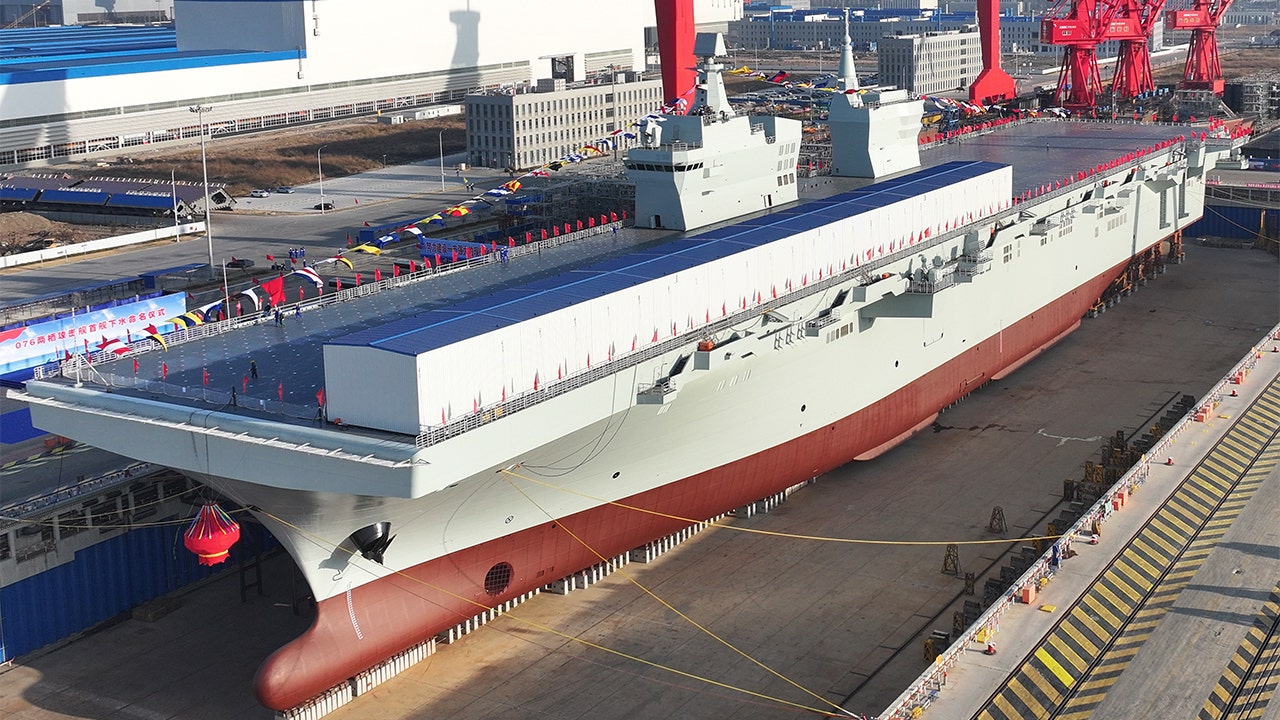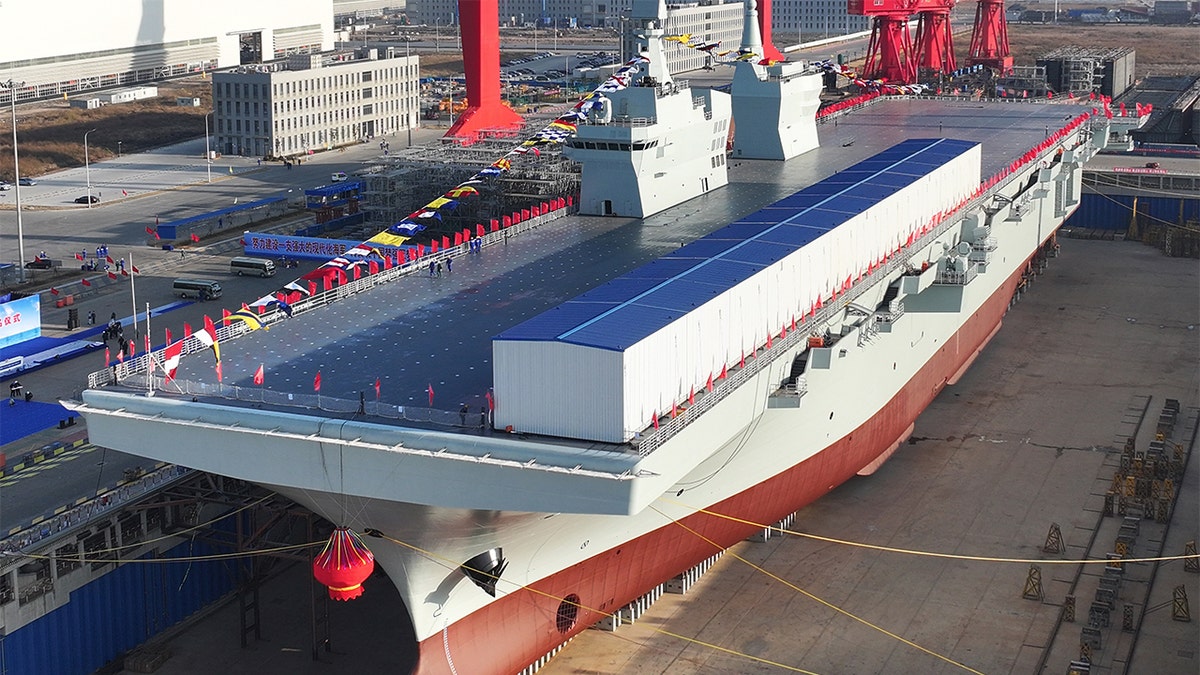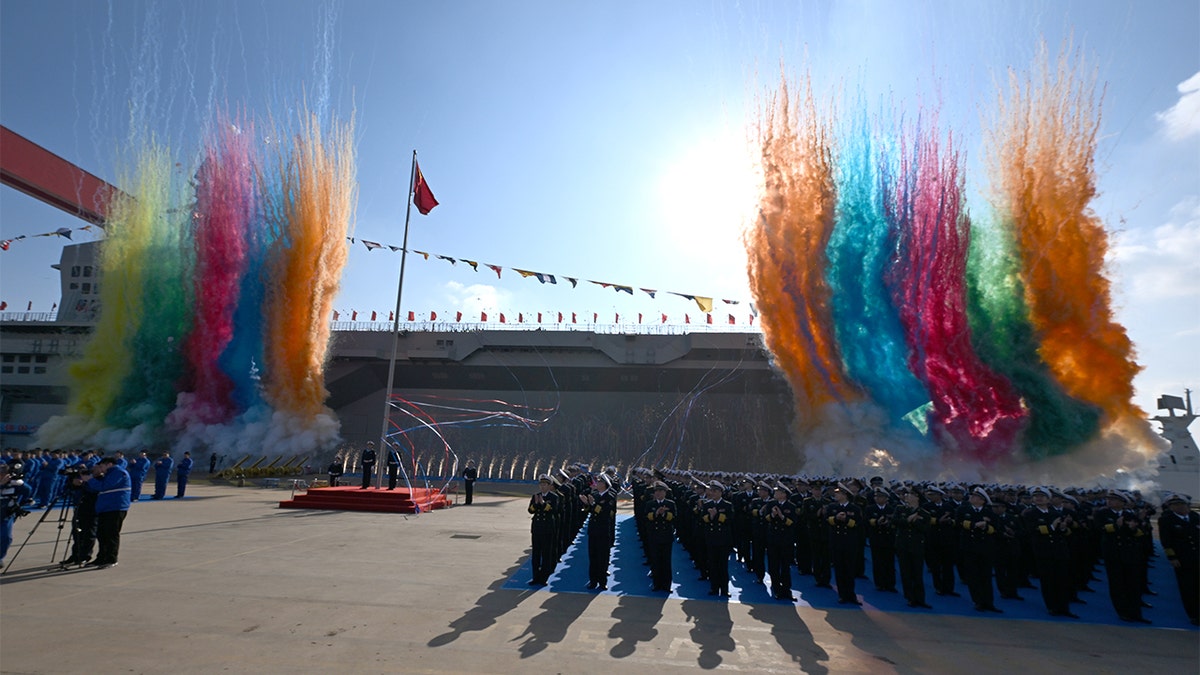World
Ukraine has a list of ‘war sponsors.’ But how exactly does it work?

Ukraine’s list of “international sponsors of the war” targets foreign companies that are still doing business in Russia despite pressure to pull out.
When it comes to foreign policy, name-shaming can be a mighty force.
Since Russia launched the full-scale invasion of Ukraine, the authorities in Kyiv have made remarkable use of finger-pointing to expose those considered to be an accessory to Vladimir Putin’s attempted revisionism of European history.
Multinationals, CEOs, administrations, lawmakers, party leaders and heads of state have all been the target of Ukraine’s uncompromising censure. But the scolding strategy, which merges techniques of diplomacy, public relations and social media, has at times put Western allies in an evidently uncomfortable position, much to their chagrin.
This simmering tension has again come to the surface over Ukraine’s list of “international sponsors of war,” a compendium of foreign companies that, in Kyiv’s view, support the war through their decision to continue doing business in Russia, paying taxes to the central government and propping up the federal budget that bankrolls the military.
The firms and their top executives are accused of supplying “goods and services of critical purpose” that help perpetuate the invasion and “thereby financing terrorism,” an explosive indictment that would make any enterprise break out in a cold sweat.
Since its launch last summer, the list has grown in size and currently encompasses 102 individuals and 26 companies, 17 of which have links to the European Union.
One of them is OTP Bank, Hungary’s largest commercial bank, whose addition earlier this month triggered a furious response from Budapest. Péter Szijjártó, the country’s foreign affairs minister, called it “unacceptable” and “scandalous” and demanded its immediate withdrawal.
The bank, which serves over 2.4 million clients in Russia, is accused of recognising the so-called “people’s republics” in the occupied territories of Donetsk and Luhansk and providing “preferential credit terms” to the Russian armed forces, allegations denied by the company.
“OTP Group operates in compliance with all international sanctions and local laws in all its markets, including Russia,” a spokesperson for the company said in a statement, noting the bank’s 0.17% market share in Russia. “We consider our inclusion on the list to be unjustified.”
The row further escalated when the Hungarian government, in retaliation for the listing, used its veto power to block a new tranche of €500 million in EU military assistance for Ukraine. Budapest made it clear the hold-up will last as long as the bank remains designated.
The controversy forced Josep Borrell, the EU’s foreign policy chief, to mediate and reach out to his Ukrainian counterparts in a bid to appease Hungary’s rage and find a compromise. (The EU has neither endorsed nor disputed the list and has not provided any input to the Kyiv authorities.)
“We have to do everything we can in order to make the next package of military support for Ukraine being approved. If one member state has a difficulty, let’s discuss about it,” Borrell said.
A contentious selection
What is perhaps most remarkable about Ukraine’s list of “international sponsors of war” is the fact that it is absolutely devoid of legal power. Being on the list does not entail the freezing of assets, a travel ban, trade restrictions or any other consequence akin to a sanction.
The list, which is managed by Ukraine’s National Agency on Corruption Prevention (NACP), is essentially a name-shaming exercise designed to pile pressure and inflict a degree of reputational damage that is profound enough to make a foreign company cut all ties with the Russian Federation.
But the selection made by the NACP appears to be extraordinarily narrow – just 26 companies – compared to the vast reality on the ground: according to a study by Yale University, hundreds of firms maintain commercial operations in Russia in defiance of international condemnation.
Yale has found that 229 companies, including well-known brands like Italy’s Benetton and France’s Lacoste, keep “business as usual” inside the country, while an additional 175 corporations, such as Germany’s Bayer and the Netherlands’ ING Bank, are “buying time,” meaning they have paused new investment projects but still perform day-to-day transactions.
The Ukrainian list, which is predicated on the logic that doing business in Russia feeds into the federal budget and therefore finances the aggression, fails to reflect this widespread complacency, providing instead a hand-picked inventory.
By doing so, dozens – maybe hundreds – of companies still serving Russian clients are spared from the public ignominy of being labelled a “war sponsor” by a country under attack. Meanwhile, those who carry the scarlet letter are left scrambling to get it off their backs.
“There are no formal selection criteria,” a NACP spokesperson told Euronews.
However, the spokesperson explained, in practice the company should be of non-Russian origin, run a large-scale operation, have a well-known brand, be present in various jurisdictions and, most crucially, contribute somehow to the war.
“By paying taxes, supplying key goods or materials, taking part in propaganda or mobilisation campaigns, such company indirectly contributes to and keeps up Russia’s capacity to wage the war,” the spokesperson said.
This indirect link is the trickiest element behind the register: due to corporate secrecy and the opacity of the Russian state, it is difficult to draw a convincing line between doing business and subsidising a war.
The list’s official website offers only brief explanations for each designation, followed by a handful of media reports that describe the firm’s alleged wrongdoing. In some cases, the connection with the Russian Federation is not explicitly stated by NACP and is only understood if the reader visits the media reports.
Accusations and denials
As part of this article, Euronews contacted the 16 EU-based companies designated under the Ukrainian list. (A 17th company from Estonia proved unreachable.)
By the time of publication, seven of them had replied offering detailed statements in which they forcefully challenged the accusations and denounced the illegality of Russia’s invasion. An eighth company refused to comment on “commercial matters.”
Auchan, the French retailer that employs more than 350,000 people around the world, is among those facing Ukraine’s ire for continuing operations inside Russia through its subsidiary, Auchan Russia.
On its website, the NACP accuses the subsidiary of “supplying goods to the Russian military in the occupied Ukrainian territories under the guise of humanitarian aid to civilians and helping military enlistment offices recruit conscripts.”
A spokesperson for Auchan contested the claims, arguing the company “fully” respects international sanctions and has halted all investments in the 231 stores of its Russian subsidiary, which functions “in total autonomy” and only serves the “civilian population.”
“Auchan Retail does not conduct, support or finance any ‘charitable’ collections for the Russian armed forces,” the spokesperson said. “At the same time, and this information is well known to the Ukrainian authorities, we have fully contributed to maintaining the food chain for the Ukrainian civilian population. We have never stopped operating our stores and digital services, including home delivery.”
Some of the listed EU companies, like the Vienna-based Raiffeisen Bank International (RBI), say they are in the process of leaving the Russian market, a move that, in theory, would absolve them from the dreaded label of “war sponsor.”
The Austrian lender, which is considered the most important Western bank in Russia thanks to a balance sheet worth almost €27 billion, was targeted by the NACP because it is allegedly servicing “fictitious companies” in Cyprus used by “oligarchs close to the Kremlin.”
A spokesperson for RBI says the group is dealing with “highly complex” market conditions and is assessing possible pathways to complete the sale of its Russian operations, a process that will likely involve huge losses. The wind-down is being closely monitored by the Austrian government, the European Central Bank and the US Treasury Department.
“Raiffeisenbank will maintain some banking operations in Russia to meet the conditions of its banking license, and support customers including those impacted by the reduction in business activity in Russia,” the spokesperson said. “The RBI Group has a responsibility to preserve the integrity of local operations in Russia, employing over 9,000 people.”
Other EU companies found themselves on the opposite end: they say they have entirely left the Russian market and nevertheless remain designated by Ukraine. That is the case of OpenWay, a Belgium-based software vendor, which insists it completely left the country in the spring of 2022.
The company was listed for having developed Mir, a card payment system meant to replace Visa and Mastercard in the aftermath of the illegal annexation of Crimea. The NACP argues OpenWay is unable to prevent its former clients from using Mir to bypass sanctions because its licensing agreements are “perpetual.”
The vendor disputes this connection, saying it no longer services Mir because Russia has “in-house developed software” to support the payment system for itself.
“Mir as a replacement for Visa and Mastercard is a complete failure. International acceptance is negligible and can hardly play any role in sanctions circumvention,” an OpenWay spokesperson said, noting they have asked the Ukrainian authorities to update the website “accordingly.”
According to the NACP, removal from the list is possible if firms cease all operations in Russia and provide a “realistic exit plan” that can be achieved in the short term. Asked about OpenWay’s request, a spokesperson said they were aware of media reports but had not received any official petition from the company.
“If we receive information that they have indeed left the Russian market, we will immediately remove them from the register,” the spokesperson said.

World
Jay-Z’s Accuser Can Remain Anonymous, Judge Criticizes His Lawyer’s ‘Relentless’ Filings

The woman accusing Jay-Z and Sean “Diddy” Combs of sexually assaulting her when she was 13 can proceed anonymously (“at least for now”) in her lawsuit against the rappers, a judge ruled Thursday.
New York Judge Analisa Torres also condemned the legal team representing Jay-Z (real name Shawn Carter) for the “relentless filing of combative motions containing inflammatory language and ad hominem attacks [on accuser’s lawyer, Tony Buzbee],” according to a court order obtained by Variety. “Since Carter’s attorney first appeared in this case seventeen days ago, he has submitted a litany of letters and motions attempting to impugn the character of Plaintiff’s lawyer [Buzbee].”
Judge Torres continues, calling the complaints “inappropriate, a waste of judicial resources, and a tactic unlikely to benefit his client [Jay-Z].”
Jane Doe, who filed her original lawsuit against Combs in October, and re-filed it with Carter’s name in early December, will remain anonymous at this early stage of the litigation. She could still be required by the court to reveal her identity.
Alex Spiro, a lawyer for Carter, recently asked the judge to dismiss the entertainer from the woman’s lawsuit. He cited a report from NBC News that revealed the accuser had admitted to some “inconsistencies and outright impossibilities” in her allegations. His team has also issued public statements referring to Buzbee as a “1-800 lawyer” who is “in the pursuit of money and fame.”
Judge Torres denied Carter’s request to dismiss the case. Representatives for Carter did not immediately respond to Variety‘s request for comment.
In the last few weeks, Buzbee issued his own lawsuit against Roc Nation, the entertainment company owned by Carter, claiming they are using “shadowy operatives” to bribe his former clients into filing “frivolous” complaints against him. Carter has also sued Buzbee for defamation.
Jane Doe, who alleges she was 13 when Combs and Carter raped her in 2000, says she encountered the pair at an afterparty for the MTV Music Video Awards.
Carter responded to the allegation almost immediately. “You have made a terrible error in judgment thinking that all ‘celebrities’ are the same,” Carter wrote in a letter addressing Buzbee. “I’m not from your moral world. I’m a young man who made it out of the project of Brooklyn. We don’t play these types of games. We have very strict codes and honor. We protect children, you seem to exploit people for personal gain. Only your network of conspiracy theorists, fake physics, will believe the idiotic claims you have levied against me that, if not for the seriousness surrounding harm to kids, would be laughable.”
Combs has been held in a Brooklyn jail since September. He will remain there until his trial is scheduled to begin in May.
World
China unveils world's largest amphibious warship

China has launched the first of its new line of amphibious assault ships and its biggest warship yet, strengthening what is already the world’s largest navy.
The Sichuan, a type 076 new-generation amphibious assault ship, was put into the water at a launch and naming ceremony on Friday.
With a full load displacement of 40,000 tons, the warship ranks among the world’s largest amphibious assault ships, featuring a dual-island superstructure and full-length flight deck, the People’s Liberation Army Navy (PLAN) said in a statement.
JOE BIDEN POSES WITH HUNTER’S CHINESE BUSINESS ASSOCIATES IN NEWLY SURFACED PHOTOS: ‘INCREDIBLY DAMNING’
A launching ceremony is held to unveil China’s first Type 076 new-generation amphibious assault ship, the Sichuan, at Hudong-Zhonghua Shipbuilding, a Shanghai-based subsidiary of China State Shipbuilding Corp, on December 27, 2024, in Shanghai, China. (Pu Haiyang/VCG via Getty Images)
China Bugle, an news outlet associated with the PLAN’s news media center, reported the ship will play a key role in transforming and developing the Chinese navy and enhancing its combat capabilities in the far seas.
The Sichuan is capable of launching fighter jets and unmanned drones from an electromagnetic catapult. It is designed to carry ground troops in landing craft with air support.
TIK TOK DIVESTMENT COULD BE ‘DEAL OF THE CENTURY’ FOR TRUMP, HOUSE CHINA COMMITTEE CHAIR SAYS

Named after southwest China’s Sichuan Province, the independently-developed new vessel was put into the water at a launch and naming ceremony. (Pu Haiyang/VCG via Getty Images)
The ship also features “arrester technology” that Chinese researchers boast will allow fighter jets to land on its deck, similar to an aircraft carrier.
China launched its first amphibious assault ship, a type 075 class warship called the Hainan, in 2019.
CHINA WARNS US TO STOP ARMING TAIWAN AFTER BIDEN APPROVES $571M IN MILITARY AID

Chinese military officials celebrate at the launch ceremony for the Sichuan. (Pu Haiyang/VCG via Getty Images)
The PLANmi has been working on modernizing its forces for more than a decade, with the aim of being able to operate globally rather than being restricted to waters near the Chinese mainland. China first managed to launch fighter jets with the new electromagnetic technology on its homemade aircraft carrier, the Fujian, which launched two years ago.
The Sichuan will now undergo additional tests at sea.
China has the largest navy in the world and is consistently trying to upgrade its fleet. Recently, researchers found that the country is working on designing a nuclear-powered aircraft carrier, which would allow it to deploy its ships in distant waters without needing a base to refuel.
The U.S. Navy currently has 11 nuclear-powered aircraft carriers deployed in strategic locations globally, including in the Asia-Pacific.
The Associated Press contributed to this report.
World
Health worker displaced by Israeli attacks in Gaza dies of ‘extreme cold’

Many people in Gaza lack adequate shelter and are malnourished after more than a year of Israeli attacks and blockades.
A Palestinian healthcare worker has died due to “extreme” weather conditions, according to a statement by the enclave’s Ministry of Health, as severe cold compounds the hardship faced by people displaced by Israel’s relentless attacks.
The body of Al-Hakim Ahmed al-Zaharneh, who worked at the European Gaza Hospital, was found inside his tent in al-Mawasi area, west of the city of Khan Younis, southern Gaza, the ministry said on Friday.
“This incident comes in light of the difficult humanitarian conditions that displaced citizens are experiencing, as the suffering of Gaza residents increases due to low temperatures and the lack of heating means in tents,” the ministry said.
The ministry said earlier that four Palestinian babies have died in tents in recent days amid the cold weather and widespread malnutrition.
Al Jazeera’s Hani Mahmoud, reporting from Deir el-Balah in central Gaza, said that the number of casualties in vulnerable groups is increasing due to worsening weather conditions.
“For 14 months now, people here have been lacking basic necessities to help them survive these difficult conditions – even in summer,” he said.
“Now in winter, the temperature has dropped very low, [and] people in tent camps feel the cold as being [colder] than the actual levels.”
He said that mothers often lack the strength or ability to breastfeed as they are malnourished and unwell.
“The conditions are worse for vulnerable groups like babies and, in the absence of [humanitarian aid], it is natural that deaths will happen.”
The vast majority of the Gaza Strip’s 2.4 million residents have been displaced at least once since war broke out with the Palestinian group Hamas on October 7, 2023, with many people living in tents that offer little protection from the cold, rain and flooding.
The United Nations and other organisations have repeatedly decried the worsening humanitarian conditions in Gaza, as Israeli attacks and blockades severely curtail access to food, water, medicine and other supplies.
A leading United States government organisation monitoring food crises around the world withdrew a new report this week warning of imminent famine in north Gaza under what it called Israel’s “near-total blockade,” after the US asked for its retraction, US officials told The Associated Press.
The move follows public criticism of the report from the US ambassador to Israel.
The report by the Famine Early Warning Systems Network (FEWS NET) had warned that a “famine scenario” was unfolding in northern Gaza where Israel launched a renewed offensive in early October.
Meanwhile, on Friday, the director of Gaza’s Health Ministry told Al Jazeera that Israeli forces stormed the Kamal Adwan Hospital, one of the few remaining medical facilities in north Gaza, and forced the 350 people there to evacuate, including all the patients and staff. He said contact with the hospital had been lost.
Israel’s war in Gaza has killed at least 45,436 Palestinians and wounded 108,038 since October 7, 2023, according to figures released on Friday by Gaza’s Health Ministry.
An estimated 1,139 people were killed in Israel during the Hamas-led attacks that day and more than 200 were taken captive.
-
/cdn.vox-cdn.com/uploads/chorus_asset/file/24924653/236780_Google_AntiTrust_Trial_Custom_Art_CVirginia__0003_1.png)
/cdn.vox-cdn.com/uploads/chorus_asset/file/24924653/236780_Google_AntiTrust_Trial_Custom_Art_CVirginia__0003_1.png) Technology6 days ago
Technology6 days agoGoogle’s counteroffer to the government trying to break it up is unbundling Android apps
-

 News1 week ago
News1 week agoNovo Nordisk shares tumble as weight-loss drug trial data disappoints
-

 Politics1 week ago
Politics1 week agoIllegal immigrant sexually abused child in the U.S. after being removed from the country five times
-

 Entertainment1 week ago
Entertainment1 week ago'It's a little holiday gift': Inside the Weeknd's free Santa Monica show for his biggest fans
-

 Lifestyle1 week ago
Lifestyle1 week agoThink you can't dance? Get up and try these tips in our comic. We dare you!
-
/cdn.vox-cdn.com/uploads/chorus_asset/file/25672934/Metaphor_Key_Art_Horizontal.png)
/cdn.vox-cdn.com/uploads/chorus_asset/file/25672934/Metaphor_Key_Art_Horizontal.png) Technology3 days ago
Technology3 days agoThere’s a reason Metaphor: ReFantanzio’s battle music sounds as cool as it does
-

 Technology1 week ago
Technology1 week agoFox News AI Newsletter: OpenAI responds to Elon Musk's lawsuit
-

 News4 days ago
News4 days agoFrance’s new premier selects Eric Lombard as finance minister
















